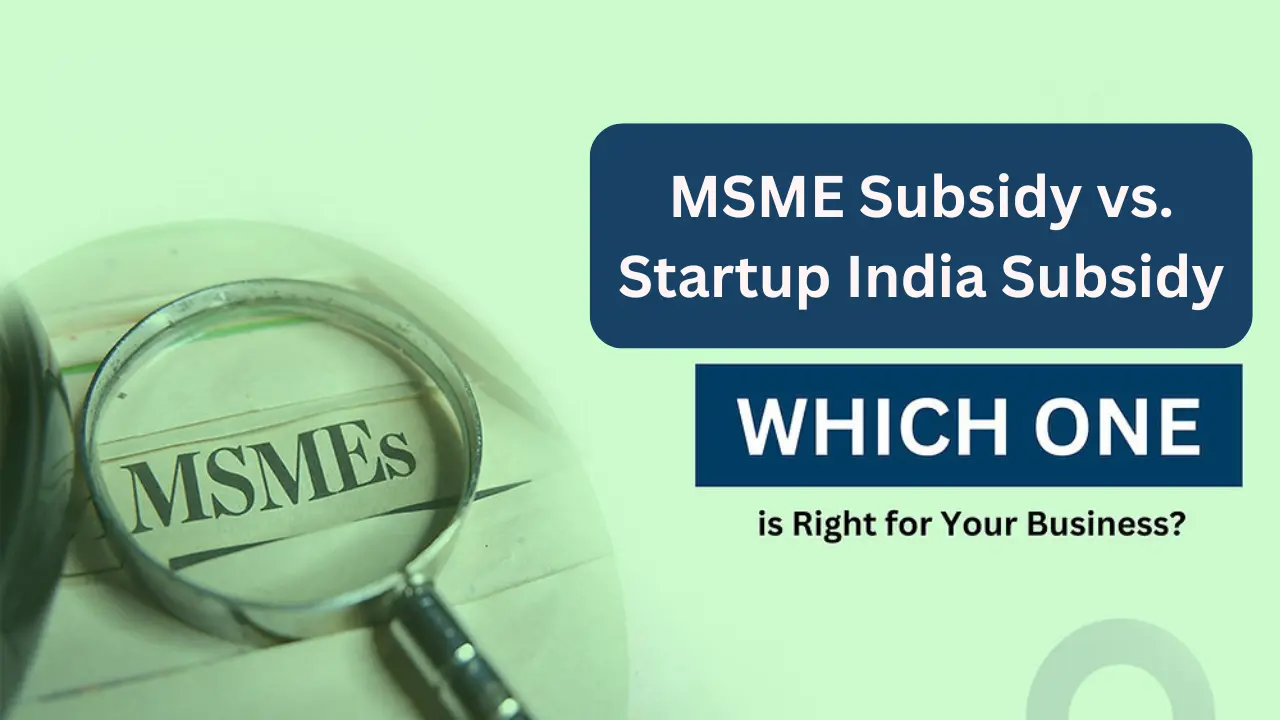Table of Contents
MSME Subsidy vs. Startup India Subsidy is a trending topic among aspiring entrepreneurs in India. Both schemes offer unique benefits, but choosing the right one is essential for long-term business growth in India. Whether you’re a small manufacturing unit or a tech startup, understanding the fine differences can empower your decisions. This detailed guide explains the top 5 smart reasons why the right choice between these subsidies can maximize your profitability and sustainability. We also highlight key government schemes, MSME support programs, and startup benefits to guide your funding path.
📌 Which is Better — MSME Subsidy or Startup India Subsidy?
MSME Subsidy vs. Startup India Subsidy: MSME subsidies are ideal for manufacturing or service enterprises needing capital support and operational help. Startup India subsidies focus more on innovation-driven companies, offering tax exemptions, seed funding, and fast-track benefits. Choose based on your business stage and model.
1. ✅ Scope of Benefits under MSME and Startup India Subsidies
The MSME Subsidy vs. Startup India Subsidy debate starts with understanding the benefits each provides. MSME subsidies offer capital support, machinery upgrades, interest subvention, and credit guarantees. In contrast, Startup India subsidies focus more on tax benefits, seed funding, and easier compliance.
| Benefit Type | MSME Subsidy | Startup India Subsidy |
|---|---|---|
| Capital Support | Yes | Limited |
| Tax Exemption | No | Yes (3 years) |
| Credit Guarantee | Yes | No |
2. ✅ Eligibility Criteria and Sector Focus
MSME schemes are geared toward traditional sectors such as manufacturing, trading, and services. You’ll need UDYAM registration to qualify. Startup India, on the other hand, caters to innovation-based ventures, particularly in tech, healthcare, fintech, and renewable energy.
- MSME: Ideal for established local businesses and small-scale industries
- Startup India: Best for new-age startups with unique ideas and scalable potential
3. ✅ Financial Assistance and Loan Subsidies
MSME Subsidy vs. Startup India Subsidy comparison often hinges on monetary benefits. MSME programs such as PMEGP and CLCSS offer up to 35% capital subsidy for eligible projects. Startup India offers support through the Startup India Seed Fund Scheme (SISFS), providing grants and convertible debentures.
Useful Government Subsidy Schemes
- PMEGP: ₹25 lakh subsidy for manufacturing units
- CLCSS: Credit-linked capital subsidy for technology upgrades
- SISFS: Up to ₹50 lakh funding for product development and market entry
4. ✅ Long-Term Business Empowerment
MSME schemes promote sustainable business by lowering borrowing costs and encouraging modernization. Startup India offers a fast-track growth mechanism through simplified regulatory processes, mentoring, and investor connections.
Pro Insight: If your goal is stability and gradual growth, MSME is the way. If you’re aiming for rapid scaling and venture capital, opt for Startup India.
5. ✅ Combining Both Subsidies for Maximum Leverage
Some startups fall under both categories and can combine subsidies. For example, a tech-driven MSME could use CLCSS benefits and also register under Startup India for tax relief. The hybrid strategy helps in building both stability and innovation potential.
Real Example: A Pune-based renewable energy firm registered as an MSME availed capital subsidy for machinery under CLCSS and got ₹20 lakh seed funding from Startup India.
Conclusion: Final Word on MSME Subsidy vs. Startup India Subsidy
There is no one-size-fits-all answer to the MSME Subsidy vs. Startup India Subsidy debate. It depends on your industry, business stage, funding needs, and growth strategy. Use this guide to analyze your startup’s goals, then pick or combine the most suitable scheme. Leverage every available tool to empower your entrepreneurial journey in India.
FAQs: MSME Subsidy vs. Startup India Subsidy
1. Can I apply for both MSME and Startup India schemes?
Yes, if you meet the eligibility criteria for both, you can benefit from each program’s unique offerings.
2. Is UDYAM registration required for Startup India?
No, UDYAM is mandatory for MSME schemes, not for Startup India. Startup India requires DPIIT recognition.
3. Which subsidy gives better financial support?
MSME schemes generally provide more direct capital support, while Startup India focuses on tax relief and seed funding.
4. Are there any sectoral limitations for Startup India?
Yes, Startup India prefers innovation-led sectors like tech, energy, and biotech over traditional businesses.
5. How do I check eligibility for both schemes?
You can visit official portals like Udyam registration and Startup India to verify requirements and apply online.







